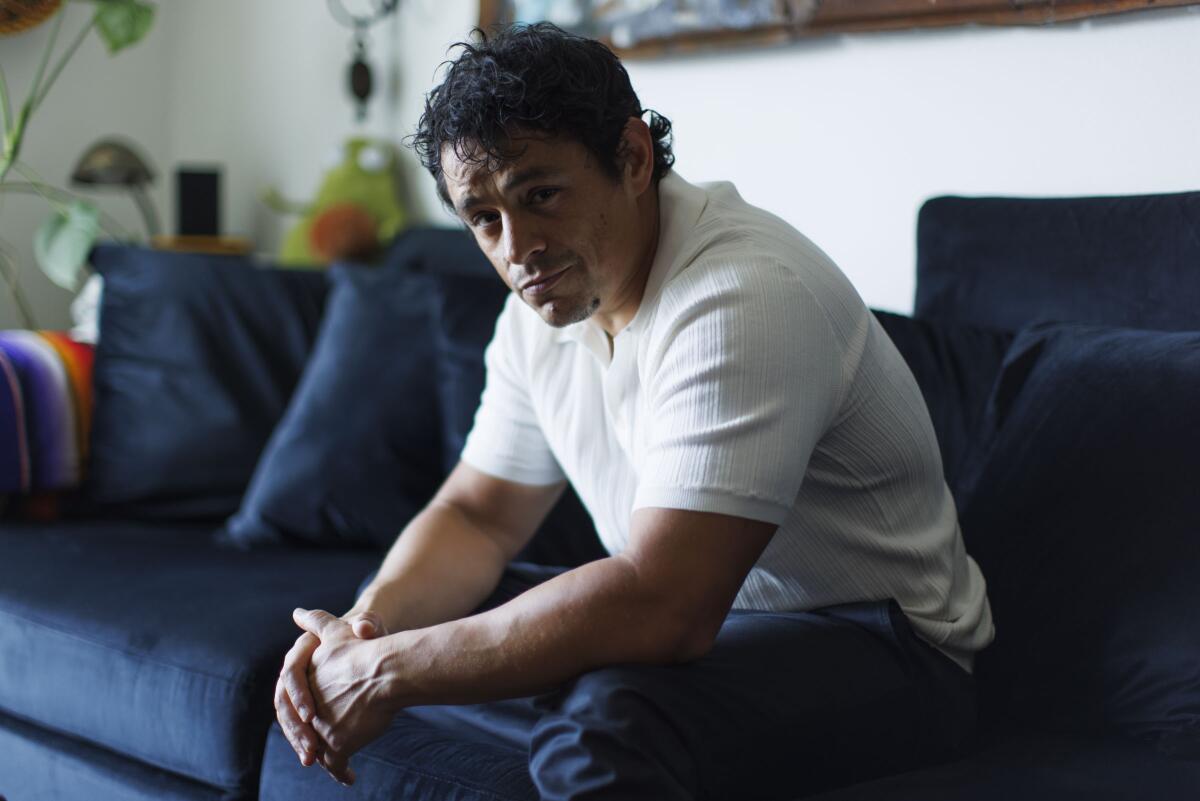The El Paso shooter will avoid the death penalty. Was justice served?

- Share via
The case against Patrick Crusius, the admitted mass shooter who killed 23 people and wounded 22 others at a Walmart in El Paso, Texas, in 2019, appears to be coming to an end.
Local outlet El Paso Matters reported last week that Dist. Atty. James Montoya would not be seeking the death penalty for Crusius, citing the wishes of the victims’ families.
“I believe in the death penalty. I believe that this defendant deserves the death penalty for what he did,” Montoya said at a news conference announcing his decision. “What changed? The answer to that, what changed was I sat down and spoke to the victims, each of them, individually. It became clear, as we met with [their] families one by one, that there is a strong and overwhelming consensus that just wanted this case over with, that wanted finality in the court process.”
Montoya is the fourth district attorney to handle the case in nearly six years.
The mass shooting is the deadliest act of anti-Latino violence in U.S. history. In a manifesto published online prior to the shooting, Crusius wrote that his actions were in response to a so-called “Hispanic invasion of Texas.” In an exclusive interview with El Paso Matters, defense attorney Joe Spencer claimed that his client believed he was following Donald Trump’s orders, citing a speech the president gave in Panama City Beach, Florida, months before the shooting took place. Spencer also argued that Crusius suffered from longstanding mental health issues.
Crusius is expected to plea guilty on April 21 to capital murder and aggravated assault charges, which carry a sentence of life in prison without the possibility of parole. In July 2023, Crusius was sentenced to 90 consecutive life sentences after pleading guilty to 50 federal hate crime charges stemming from the mass shooting.
Though the drawn-out legal proceedings against Crusius are coming to a close, some members of the victims’ families hardly feel like justice has been served.
“We’ve been dealing with this for six years. Six years is a big number when you’re holding your breath waiting for justice,” Christopher Morales, whose aunt was killed in the shooting, told local ABC affiliate KVIA. His mother and grandmother were also injured, but both survived.
“My kids will never know again what it’s like to be with their father,” said Jessica Garcia, who lost her husband Guillermo “Memo” Garcia. “My mother-in-law can never have her son replaced. It’s never enough. I don’t think there’s any justice in this world that would be enough.”
Crusius is going to spend the rest of his natural life in prison, though it hardly feels like this outcome — or any, really — will undo the damage his hateful actions have done to El Paso.
“America is tired. It’s tired of all this nonsense. It’s tired of Uvalde. It’s tired of El Paso,” Esgar Eulalio Reyes, a resident of the border city, told the New York Times. “They think that time is going to go ahead and heal the wound, but this wound is not going to heal in this community.”
One is also left with the uneasy feeling that it’s only a matter of time until another El Paso takes place. After all, mass shootings have become commonplace in America, and the hateful rhetoric that fueled Crusius’ actions has hardly disappeared.
Consider subscribing to the Los Angeles Times
Your support helps us deliver the news that matters most. Become a subscriber.
Long live Selena!

As I wrote in last week’s newsletter, Monday marked 30 years since the murder of Selena Quintanilla-Pérez at the hands of Yolanda Saldivar, a former trusted employee accused of embezzlement.
Since then, the U.S. Latino population has radically been transformed— we now account for approximately 64 million people, and are predominantly U.S.-born and English dominant. In those 3 decades, Selena’s legacy, impact and brand value have only grown. She has become a mirror for how American Latinos view themselves, as well as a bridge connecting various generations (Gen X, millennials, Gen Z and soon Generations Alpha and Beta, I’m sure).
In honor of the Tejano Queen, the bicultural totem that made us all believe that we can be de aquí y de allá, the De Los team put together a package of stories that highlight Selena’s cultural impact.
Review: In ‘Selena y Los Dinos,’ we see the Tejano queen through the eyes of her sister
Remember This Banger: On the 30th anniversary of Selena’s death, a look back at ‘Dreaming of You’
Gregory Nava on how his 1997 film ‘Selena’ has stood the test of time
Selena’s legacy lives on in these young Latina musicians
What Selena’s murder says about our fascination with death
The Selena streaming guide: Where to watch the many versions of the singer onscreen
Selena y Los PhDinos: How the singer’s legacy has helped shape academia
How Southern California celebrated Selena this past week
Stories we read this week that we think you should read
From the L.A. Times
Jesse Garcia and his epic, winding hero’s journey to Hollywood

Actor Jesse Garcia thought his career would take off after landing his breakout role in the 2006 film “Quinceañera,” a coming-of-age film that made waves at the Sundance Film Festival. But the Wyoming native’s journey in Hollywood proved to be more difficult than previously anticipated. Garcia is featured in the new Disney+ movie “Alexander and the Terrible, Horrible, No Good, Very Bad Road Trip,” and is part of the cast of Christopher Nolan’s next film, “The Odyssey.”
‘Los Frikis’ captures the punk rock spirit of Cuban rebellion
Bringing Cuban history to life with sympathetic and compelling characters, “Los Frikis” dramatizes how hard it was to survive in Cuba in the ’90s. After the collapse of the Soviet Union in 1991, Cuba’s economy went with it, having relied on the U.S.S.R.’s support. The indie film is now available to stream on demand.
Father Richard Estrada, defender of the downtrodden, dead at 83
The son of Mexican immigrants, Estrada was a champion of the downtrodden. He organized farmworkers with Cesar Chavez and Dolores Huerta and opened the first shelter for homeless migrant youth in Los Angeles. Estrada died Monday from COVID-related complications. He was 83.
“He was one of the greatest human beings that I’ve run across in my lifetime,” said actor Edward James Olmos, who worked closely with Estrada on various causes.
As children are pulled into immigration court, many must fend for themselves
Unaccompanied minors face a new reality under the Trump administration as they lose avenues to legal representation and fears grow about expediting removals.
“These kids often have no idea what’s going on, and without a lawyer, they’re doomed,” Holly S. Cooper, who has represented children in immigration court, told The Times.
Former federal health chief Xavier Becerra announces run for California governor
Becerra, the U.S. Health and Human Services secretary under President Biden, announced Wednesday that he is running for governor in 2026. He joins a very crowded race — Democrats Lt. Gov. Eleni Kounalakis, state Controller Betty Yee, former Rep. Katie Porter and former Los Angeles Mayor Antonio Villaraigosa are also running.
From elsewhere
The Makeup Artist Donald Trump Deported Under the Alien Enemies Act (New Yorker)
Andry José Hernández Romero was among the Venezuelan nationals transferred to a maximum security prison in El Salvador. Immigration officials accused him of belonging to the Tren de Aragua gang because of his tattoos, but a journalist who has reported extensively on gangs in Venezuela says that these criminal groups do not use identifying tattoos whatsoever. Story is paywalled.
Questions linger on future of Smithsonian museums on women, Latinos (Roll Call)
The Smithsonian Museum of the American Latino, which was created in 2020, faces uncertainty because of the Trump administration’s DEI efforts.
A small rural community in southeastern Pennsylvania is responsible for 70% of all mushrooms consumed by Americans. Like the rest of the agricultural industry, these farmers depend on migrant workers.




